|
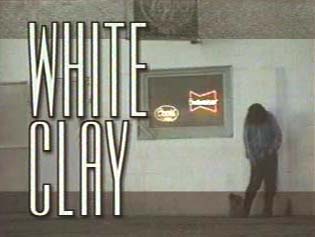  It could
be the first week of any month of the year when paychecks and government
support checks are cashed on the Oglala Sioux reservation. A lot of that
money makes its way to four little stores with licenses to sell beer. It could
be the first week of any month of the year when paychecks and government
support checks are cashed on the Oglala Sioux reservation. A lot of that
money makes its way to four little stores with licenses to sell beer.
 [Don Schwarting, liquor store owner] "The Ogallala
Sioux people are fun loving, humorous, good-natured people. They enjoy getting
together and having a good time or going places and having a good time.
And this involves alcohol usually." [Don Schwarting, liquor store owner] "The Ogallala
Sioux people are fun loving, humorous, good-natured people. They enjoy getting
together and having a good time or going places and having a good time.
And this involves alcohol usually."
 Don Schwarting knows he runs one of the most controversial
businesses in Nebraska. Public opinion doesn't much matter to him when his
customers cast their votes with dollars. Don Schwarting knows he runs one of the most controversial
businesses in Nebraska. Public opinion doesn't much matter to him when his
customers cast their votes with dollars.
 [Schwarting] "There's not anybody that's walked
in here tonight that's made me the bad guy. Has there? No, not a one. It's
not because they're customers or nothing, it's because they live here. But
the guys that don't live here are making us look like the bad guys. They
don't live here and they don't work here and don't want to." [Schwarting] "There's not anybody that's walked
in here tonight that's made me the bad guy. Has there? No, not a one. It's
not because they're customers or nothing, it's because they live here. But
the guys that don't live here are making us look like the bad guys. They
don't live here and they don't work here and don't want to."
 None of the customers at the Arrowhead Inn cared to
share their opinion with us that night. At the same time rush hour begins
in White Clay, Officer John of the Ogallala Sioux tribal police is coming
on duty. None of the customers at the Arrowhead Inn cared to
share their opinion with us that night. At the same time rush hour begins
in White Clay, Officer John of the Ogallala Sioux tribal police is coming
on duty.
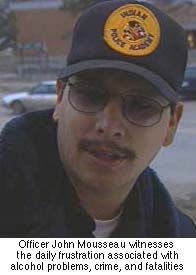  [John Mousseau, Pine Ridge Police Dept.] "Very
seldom do we come across an incident that isn't alcohol-related. [John Mousseau, Pine Ridge Police Dept.] "Very
seldom do we come across an incident that isn't alcohol-related.
 His tour of duty starts with a triple on the two-mile
stretch of road between Pine Ridge and White Clay, once calculated to be
the deadliest stretch of road in America. His tour of duty starts with a triple on the two-mile
stretch of road between Pine Ridge and White Clay, once calculated to be
the deadliest stretch of road in America.
 [Mousseau] "We used to go up top of the hill because
I lived where we could walk up top of the hill and we used to watch maybe
about -- every weekend maybe two, maybe three car wrecks a week. A lot of
them are fatalities, you know, so I grew up knowing a lot of negativity
on this road, you know. I would hear a lot of people saying they're going
to White Clay, automatically I would think of a car wreck, you know. A lot
of people I knew that got killed on this road, you know." [Mousseau] "We used to go up top of the hill because
I lived where we could walk up top of the hill and we used to watch maybe
about -- every weekend maybe two, maybe three car wrecks a week. A lot of
them are fatalities, you know, so I grew up knowing a lot of negativity
on this road, you know. I would hear a lot of people saying they're going
to White Clay, automatically I would think of a car wreck, you know. A lot
of people I knew that got killed on this road, you know."
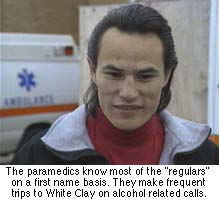
 This is a trading post in its classic sense. White business
owners have been here since at least the turn of the century. It straddles
a length of Nebraska State highway and begins where the reservation land
ends. As soon as you cross the border out of South Dakota, Pine Ridge Reservation,
you pass into Nebraska and you're in White Clay. It's unincorporated, only
about 30 people live here if that, and there aren't very many businesses.
The very first business you come across after that scrap yard, the Arrowhead
Inn, one of the four liquor stores. They've got two grocery stores, one
on either side of the road, an auto parts store, a couple of other shut
down businesses and then three other liquor stores on the other end of town.
After only about a minute, you have passed out of White Clay, and you're
heading south to Rushville. If you stop for a while and not many non-Indians
do, you can see what causes such pain and outrage. It's obvious the liquor
sales are steady and often in unsettling quantities. The State of Nebraska
estimates that four million cans of beer a year are sold here, probably
the highest per capita sales in the entire state. The effects are obvious
as well. This is a trading post in its classic sense. White business
owners have been here since at least the turn of the century. It straddles
a length of Nebraska State highway and begins where the reservation land
ends. As soon as you cross the border out of South Dakota, Pine Ridge Reservation,
you pass into Nebraska and you're in White Clay. It's unincorporated, only
about 30 people live here if that, and there aren't very many businesses.
The very first business you come across after that scrap yard, the Arrowhead
Inn, one of the four liquor stores. They've got two grocery stores, one
on either side of the road, an auto parts store, a couple of other shut
down businesses and then three other liquor stores on the other end of town.
After only about a minute, you have passed out of White Clay, and you're
heading south to Rushville. If you stop for a while and not many non-Indians
do, you can see what causes such pain and outrage. It's obvious the liquor
sales are steady and often in unsettling quantities. The State of Nebraska
estimates that four million cans of beer a year are sold here, probably
the highest per capita sales in the entire state. The effects are obvious
as well.
 [Ambulance driver] "I'm barely 25 and there's guys
up there younger than me now and they look like 40, 50 years old." [Ambulance driver] "I'm barely 25 and there's guys
up there younger than me now and they look like 40, 50 years old."
 The teams that work as paramedics on the tribe's rescue
squad expect at least one call a day off the reservation. When you hear
that you've got a call coming from White Clay, how does it make you feel? The teams that work as paramedics on the tribe's rescue
squad expect at least one call a day off the reservation. When you hear
that you've got a call coming from White Clay, how does it make you feel?
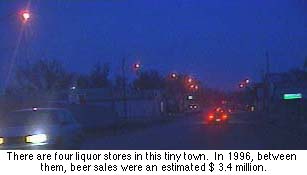
 [Ambulance driver] "We try to figure out which one
is it. After a while you get to know them by first name, you know who you're
going after. I guess some of them don't stay down there, but they always
come up here. They just go down there to get it and bring it back up here.
It's kind of reservation-wide, I would say, because people still take it
home and do the same thing, but they're just not staying up there. Just
the regular ones that are up there all the time." [Ambulance driver] "We try to figure out which one
is it. After a while you get to know them by first name, you know who you're
going after. I guess some of them don't stay down there, but they always
come up here. They just go down there to get it and bring it back up here.
It's kind of reservation-wide, I would say, because people still take it
home and do the same thing, but they're just not staying up there. Just
the regular ones that are up there all the time."
 At the headquarters of tribal police, the officers and
their acting chief of police think there's a link between other crimes --
thefts and burglaries -- in the sad cycle of alcohol abuse at White Clay. At the headquarters of tribal police, the officers and
their acting chief of police think there's a link between other crimes --
thefts and burglaries -- in the sad cycle of alcohol abuse at White Clay.
 [Wendell Yellow Bull, Acting Police Chief] "A lot
of property is taken from our area and exchanged for alcohol. It kind of
creates that clientele for a lot of things that happen here. You ask anybody,
.....'Did you ever have something stolen?' ...'Yeah, I have.' Where do you
think you would look for it? ..'Oh, I would go to White Clay and I would
stop and go over to the beer establishment to see if it was taken there,
pawned there." [Wendell Yellow Bull, Acting Police Chief] "A lot
of property is taken from our area and exchanged for alcohol. It kind of
creates that clientele for a lot of things that happen here. You ask anybody,
.....'Did you ever have something stolen?' ...'Yeah, I have.' Where do you
think you would look for it? ..'Oh, I would go to White Clay and I would
stop and go over to the beer establishment to see if it was taken there,
pawned there."
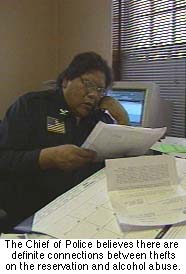
 [Kelly] "Why?" [Kelly] "Why?"
 [Yellow Bull] "Because that's where the majority
of the stuff goes." [Yellow Bull] "Because that's where the majority
of the stuff goes."
They are charges often made -- stolen property, even sex given in trade
for beer. Often made but never proven. What is beyond question is that alcohol
has taken a horrible toll on the Ogallala Sioux and most of the alcohol
comes from White Clay in four little stores.
 [John Yellowbird Steele, Ogallala Sioux, Chairman] "I
had Mr. Little Jaw Means just the past few months murdered there. It was
identified he was hitting the head with a blunt object. Mr. Thomas Twist,
Mr. Berdoe in prior years murdered. The State of Nebraska doesn't seem to
care in looking into or trying to resolve this." [John Yellowbird Steele, Ogallala Sioux, Chairman] "I
had Mr. Little Jaw Means just the past few months murdered there. It was
identified he was hitting the head with a blunt object. Mr. Thomas Twist,
Mr. Berdoe in prior years murdered. The State of Nebraska doesn't seem to
care in looking into or trying to resolve this."
 The chairman of the Ogallala Sioux, John Yellowbird
Steele, testified at the beginning of the year before the State's Liquor
Control Commission. All four of the license holders were called before the
board that requires businesses which sell liquor to follow the law. Once
again law enforcement says their hands are tied. There have been no formal
complaints about any of the stores. The chairman of the Ogallala Sioux, John Yellowbird
Steele, testified at the beginning of the year before the State's Liquor
Control Commission. All four of the license holders were called before the
board that requires businesses which sell liquor to follow the law. Once
again law enforcement says their hands are tied. There have been no formal
complaints about any of the stores.
 [Terry Robbins, Sheriff, Sheridan Co.] "There ain't
an officer that works for me that wouldn't say a liquor violation in a heartbeat
if they seen it or had somebody complain or, you know, to get a conviction.
It don't do no good to give a citation if you can't get a conviction." [Terry Robbins, Sheriff, Sheridan Co.] "There ain't
an officer that works for me that wouldn't say a liquor violation in a heartbeat
if they seen it or had somebody complain or, you know, to get a conviction.
It don't do no good to give a citation if you can't get a conviction."
 The liquor license holders remain silent. Their attorney
said they have done nothing wrong. Their business is legal. The liquor license holders remain silent. Their attorney
said they have done nothing wrong. Their business is legal.
 [Don Dunn, Atty. for liquor stores] "We also recognize
that we need to be a part of a plan of action to address those areas of
concern." [Don Dunn, Atty. for liquor stores] "We also recognize
that we need to be a part of a plan of action to address those areas of
concern."
 The people most harmed, the Ogallala Sioux, admit they
frequently won't work with the system and the system in this case, local
and state regulators and law enforcement, have a history of letting things
be in White Clay. That's been acceptable to the store owners. The people most harmed, the Ogallala Sioux, admit they
frequently won't work with the system and the system in this case, local
and state regulators and law enforcement, have a history of letting things
be in White Clay. That's been acceptable to the store owners.
 [Kelly] "Is there anything you can do?" [Kelly] "Is there anything you can do?"
 [Schwarting] "I'm open to suggestions. What's your
suggestions?" [Schwarting] "I'm open to suggestions. What's your
suggestions?"
 [Kelly] "Your attorney said that you would be willing
to do something." [Kelly] "Your attorney said that you would be willing
to do something."
 [Schwarting] "I'm asking you what your suggestion
would be?" [Schwarting] "I'm asking you what your suggestion
would be?"
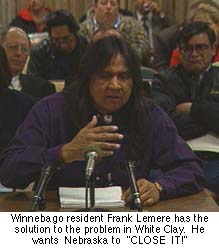
 There are a lot of suggestions. At the same meeting,
Frank Lemere of Nebraska' Winnebago tribe insisted the State take extreme
action. There are a lot of suggestions. At the same meeting,
Frank Lemere of Nebraska' Winnebago tribe insisted the State take extreme
action.
 [Frank Lemere, Winnebago Tribe] "I have an answer
to the problem in White Clay. We need to shut White Clay down. We need to
shut it down tomorrow." [Frank Lemere, Winnebago Tribe] "I have an answer
to the problem in White Clay. We need to shut White Clay down. We need to
shut it down tomorrow."
That won't happen. Liquor sales in White Clay won't stop without the complaints
made, proof found, and legal proceedings completed.
 [Highway Patrol Officer]
"They are passed out all
along this building right here and sitting outside drinking and there were
a lot of cars parked there." [Highway Patrol Officer]
"They are passed out all
along this building right here and sitting outside drinking and there were
a lot of cars parked there."
The commander of the Nebraska State Patrol took Governor Nelson on a tour
last fall.
 [Gov. Nelson] "Are most of the residents who live
here, are they Native American?" [Gov. Nelson] "Are most of the residents who live
here, are they Native American?"
 [Highway Patrol Officer] "All white." [Highway Patrol Officer] "All white."
 The other business owners in town, and there are other
businesses, told the Governor additional police patrols could take the edge
off the problem that they see more a matter of public relations than public
safety. The other business owners in town, and there are other
businesses, told the Governor additional police patrols could take the edge
off the problem that they see more a matter of public relations than public
safety.
 [Business Owner] "We're really taking a hit here,
you know. I don't think anybody is doing anything illegal. Just maybe more
visibility, you know, with some units and stuff like that." [Business Owner] "We're really taking a hit here,
you know. I don't think anybody is doing anything illegal. Just maybe more
visibility, you know, with some units and stuff like that."
 [Gov. Nelson] "If you could change anything, what
would you change?" [Gov. Nelson] "If you could change anything, what
would you change?"
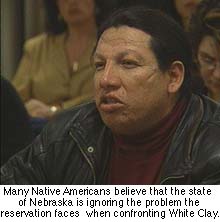
 [Business Owner] "I think just
a little more visibility probably." [Business Owner] "I think just
a little more visibility probably."
 [Gov. Nelson] "Law enforcement, you mean? [Gov. Nelson] "Law enforcement, you mean?
 "It's not something that just sits here to serve alcohol
totally just to try to destroy somebody. It's definitely not there to do
that." "It's not something that just sits here to serve alcohol
totally just to try to destroy somebody. It's definitely not there to do
that."
 Just up the road minutes later when the Governor tried
unsuccessfully to speak with a clerk at one of the liquor stores, one of
the customers did take a moment of the Governor's time to ask for spare
change. Just up the road minutes later when the Governor tried
unsuccessfully to speak with a clerk at one of the liquor stores, one of
the customers did take a moment of the Governor's time to ask for spare
change.
 [Gov. Nelson] "I don't think I can help you out,
I'm sorry. I don't have any extra money. I'm just getting ready to go to
Asia." [Gov. Nelson] "I don't think I can help you out,
I'm sorry. I don't have any extra money. I'm just getting ready to go to
Asia."
 Money is another issue here. For the State Patrol, Captain
Tussing pointed out that spending more time in a town with barely 30 people
diverts troopers from other far flung panhandle towns. The Sheridan County
sheriff has limited resources and an all white corp of deputies who get
little cooperation. Money is another issue here. For the State Patrol, Captain
Tussing pointed out that spending more time in a town with barely 30 people
diverts troopers from other far flung panhandle towns. The Sheridan County
sheriff has limited resources and an all white corp of deputies who get
little cooperation.
 [Native American elder] "We're not dogs and we're
not monkeys... you know!" [Native American elder] "We're not dogs and we're
not monkeys... you know!"
 [Highway Patrol Officer] "We're trying to figure
out how we can help you." [Highway Patrol Officer] "We're trying to figure
out how we can help you."
 [Native American elder] "Us Indians we help ourselves.
Just stay out of the business... and no more cameras." [Native American elder] "Us Indians we help ourselves.
Just stay out of the business... and no more cameras."
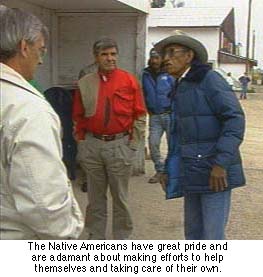
 In a backwards sense, the tribe itself has created White
Clay. Alcohol cannot be sold on the reservations. In an effort to protect
its people from liquor, it has handed a business opportunity to Nebraska's
white entrepreneurs. In a backwards sense, the tribe itself has created White
Clay. Alcohol cannot be sold on the reservations. In an effort to protect
its people from liquor, it has handed a business opportunity to Nebraska's
white entrepreneurs.
 [Mousseau] "A lot of people don't like to talk
about it but I think legalizing alcohol down here is one of the solutions
they should seriously look at. What they could do is do the same thing and
take that money they're making and open up treatment centers." [Mousseau] "A lot of people don't like to talk
about it but I think legalizing alcohol down here is one of the solutions
they should seriously look at. What they could do is do the same thing and
take that money they're making and open up treatment centers."
 [Mousseau] "Hello. Somebody reported Tom as being
drunk and driving all over. Is he okay?" [Mousseau] "Hello. Somebody reported Tom as being
drunk and driving all over. Is he okay?"
 [Woman at door]"Mm-hmm." [Woman at door]"Mm-hmm."
It is not likely the tribe will lift its ban on alcohol in light of the
bitter history of alcohol and Native Americans.
 [Wendell Yellow Bull] "Legalize it and bring it
here, then whose problem is it next? It's going to be ours. Once it's ours,
then the question is the money that we generate, is it truly going to help
our tribe or do we just become a formalized drug sale." [Wendell Yellow Bull] "Legalize it and bring it
here, then whose problem is it next? It's going to be ours. Once it's ours,
then the question is the money that we generate, is it truly going to help
our tribe or do we just become a formalized drug sale."
 [Mousseau] "Let's go... give you a nice warm place
to sleep... ..c'mon... let's go. There's a lot of kids here... let's go.
Let's go out this way. Come on...right over here. See where my car is parked.
Come on. I will help you walk." [Mousseau] "Let's go... give you a nice warm place
to sleep... ..c'mon... let's go. There's a lot of kids here... let's go.
Let's go out this way. Come on...right over here. See where my car is parked.
Come on. I will help you walk."
 There is clearly a need for treatment of alcoholics
on the reservation and it frustrates tribal leaders that of the tens of
thousands of dollars paid in liquor taxes to Nebraska, none of it is used
to help native people get the treatment needed to break their cycle of addiction.
The only convenient option in the panhandle is a tiny clinic over in Gordon. There is clearly a need for treatment of alcoholics
on the reservation and it frustrates tribal leaders that of the tens of
thousands of dollars paid in liquor taxes to Nebraska, none of it is used
to help native people get the treatment needed to break their cycle of addiction.
The only convenient option in the panhandle is a tiny clinic over in Gordon.
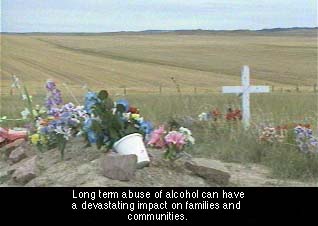
 [Judy Morgan, NE Indian Commission] "Nebraska is benefiting
financially and those establishments, those owners, their family are generation
after generation making millions of dollars and the tribe isn't and the
people aren't and they're not getting any dollars for rehab for alcohol
treatment." [Judy Morgan, NE Indian Commission] "Nebraska is benefiting
financially and those establishments, those owners, their family are generation
after generation making millions of dollars and the tribe isn't and the
people aren't and they're not getting any dollars for rehab for alcohol
treatment."
 The director of Nebraska's Indian Commission has been working with tribal leaders from Pine Ridge and State officials to find if not solutions at least some responses to reduce the impact of Nebraska's alcohol on the Sioux
people. The director of Nebraska's Indian Commission has been working with tribal leaders from Pine Ridge and State officials to find if not solutions at least some responses to reduce the impact of Nebraska's alcohol on the Sioux
people.
 [Morgan] "Well, I don't think it's hopeless and I think,
you know, I'm not going to buy into that well, it's always happened so let's
just let it go on happening." [Morgan] "Well, I don't think it's hopeless and I think,
you know, I'm not going to buy into that well, it's always happened so let's
just let it go on happening."
 Meanwhile there hasn't been much change in the nightly
routine of the tribal police officers dealing with White Clay's customers. Meanwhile there hasn't been much change in the nightly
routine of the tribal police officers dealing with White Clay's customers.
 [Mousseau] "I mean, if they want to drink, they're still
going to get it. White Clay, you know, if maybe more patrol up there but
shutting down White Clay, I don't think it is going to solve anything but
it might be a step." [Mousseau] "I mean, if they want to drink, they're still
going to get it. White Clay, you know, if maybe more patrol up there but
shutting down White Clay, I don't think it is going to solve anything but
it might be a step."
|